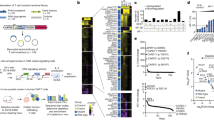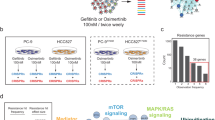Abstract
p53 gene therapy can induce tumor regression, but the low efficacy of in vivo gene transfer has greatly hampered the mechanistic analysis of this antitumoral activity. We therefore used a p53-null human NSCLC cell line in which we reintroduced the wild-type p53 gene under control of a tetracycline-dependent promoter. P53 induction provokes cell cycle arrest in G0/G1 and G2/M phase, an up-regulation of p21, a down-regulation of cyclin B1 and appearance of senescence features without down-regulation of human telomerase reverse transcriptase. No detectable morphological changes of apoptosis nor procaspase-3 activation are observed. In subcutaneous tumors grafted in nude mice, the induction of p53 expression leads to a complete and long-lasting tumor regression in 28 days which is associated with cell cycle arrest, but not detectable apoptosis nor inhibition of angiogenesis. These results show that irreversible cell cycle arrest is sufficient to elicit tumor regression after p53 gene transfer in p53-deficient tumor cells.
This is a preview of subscription content, access via your institution
Access options
Subscribe to this journal
Receive 12 print issues and online access
$259.00 per year
only $21.58 per issue
Buy this article
- Purchase on Springer Link
- Instant access to full article PDF
Prices may be subject to local taxes which are calculated during checkout






Similar content being viewed by others
References
Klein G . The approaching era of the tumor suppressor genes Science 1987 238: 1539–1545
Takahashi T et al. Wild-type but not mutant p53 suppresses the growth of human lung cancer cells bearing multiple genetic lesions Cancer Res 1992 52: 230–2343
Cai DW et al. Stable expression of the wild-type p53 gene in human lung cancer cells after retrovirus-mediated gene transfer Hum Gene Ther 1993 4: 617–624
Baker SJ et al. Suppression of human colorectal carcinoma cell growth by wild-type p53 Science 1990 249: 912–915
Takahashi T et al. p53: a frequent target for genetic abnormalities in lung cancer Science 1989 246: 491–494
Favrot M, Coll JL, Louis N, Negoescu A . Cell death and cancer: replacement of apoptotic genes and inactivation of death suppressor genes in therapy Gene Therapy 1998 5: 728–739
Fujiwara T et al. Therapeutic effect of a retroviral wild-type p53 expression vector in an orthotopic lung cancer model J Natl Cancer Inst 1994 86: 1458–1462
Wills KN et al. Development and characterization of recombinant adenoviruses encoding human p53 for gene therapy of cancer Hum Gene Ther 1994 5: 1079–1088
Coll JL et al. Antitumoral activity of bax and p53 gene transfer in lung cancer: in vitro and in vivo analysis Hum Gene Ther 1998 9: 2063–2074
Hamada K et al. Adenovirus-mediated transfer of a wild-type p53 gene and induction of apoptosis in cervical cancer Cancer Res 1996 56: 3047–3054
Symonds H . P53-dependent apoptosis suppresses tumor growth and progression in vivo Cell 1994 78: 703–711
Dameron KM et al. Control of angiogenesis in fibroblast by p53 regulation of thrombospondin-1 Science 1994 265: 1582–1584
Kistner A et al. Doxycycline-mediated quantitative and tissue-specific control of gene expression in transgenic mice Proc Natl Acad Sci USA 1996 93: 10933–10938
Kistner A et al. Doxycycline-mediated quantitative and tissue-specific control of gene expression in transgenic mice
Yang ZY et al. The p21 cyclin-dependent kinase inhibitor suppresses tumorigenicity in vivo Nat Med 1995 1: 1052–1056
Michalovitz D, Halevy O, Oren M . Conditional inhibition of transformation and of cell proliferation by a temperature-sensitive mutant of p53 Cell 1990 62: 671–680
Chen X, Ko LJ, Jayaraman L, Prives C . p53 levels, functional domains, and DNA damage determine the extent of the apoptotic response of tumor cells Genes Dev 1996 10: 2438–2451
Chen QM, Liu J, Merrett JB . Apoptosis or senescence-like growth arrest: influence of cell-cycle position, p53, p21 and BAX in H2O2 response of normal human fibroblasts Biochem J 2000 347: 543–551
Mukhopadhyay T, Roth JA . Superinduction of wild-type p53 protein after 2-methoxyestradiol treatment of Ad5p53-transduced cells induces tumor cell apoptosis Oncogene 1998 17: 241–246
Craig et al. Effects of adenovirus-mediated p16INK4A expression on cell cycle arrest are determined by endogenous p16 and Rb status in human cancer cells Oncogene 1998 16: 265–272
Alemany R et al. Growth inhibitory effect of anti-K-ras adenovirus on lung cancer cells Cancer Gene Ther 1996 3: 296–301
Lundberg AS, Hahn WC, Gupta P, Weinberg RA . Genes involved in senescence and immortalization Curr Opin Cell Biol 2000 12: 705–709
Sugrue MM et al. Wild-type p53 triggers a rapid senescence program in human tumor cells lacking functional p53 Proc Natl Acad Sci USA 1997 94: 9468–9653
Xu D et al. Down-regulation of telomerase reverse transcriptase mRNA expression by wild type p53 in human tumor cells Oncogene 2000 19: 5123–5133
Kanaya T et al. Adenoviral expression of p53 represses telomerase activity through down-regulation of human telomerase reverse transcriptase transcription Clin Cancer Res 2000 6: 1239–1247
Jones CJ et al. Evidence for a telomere-independent ‘clock’ limiting RAS oncogene-driven proliferation of human thyroid epithelial cells Mol Cell Biol 2000 20: 5690–5699
Wei S, Sedivy JM . Expression of catalytically active telomerase does not prevent premature senescence caused by overexpression of oncogenic Ha-Ras in normal human fibroblasts Cancer Res 1999 59: 1539–1543
Holmgren L, Jackson G, Arbiser J . p53 induces angiogenesis-restricted dormancy in a mouse fibrosarcoma Oncogene 1998 17: 819–824
Riccioni T et al. Adenovirus-mediated wild-type p53 overexpression inhibits endothelial cell differentiation in vitro and angiogenesis in vivo Gene Therapy 1998 5: 747–754
Smith et al. Replicative senescence: implications for in vivo aging and tumor suppression Science 1996 273: 63–67
Negoescu A et al. In situ apoptotic cell labeling by the TUNEL method improvement and evolution on cell preparations J Histochem Cytochem 1996 44: 959–968
Dimri GP et al. A biomarker that identifies senescent human cells in culture and in aging skin in vivo Proc Natl Acad Sci USA 1995 92: 9363–9367
Acknowledgements
The authors thank Dominique Desplanques et Corine Tenaud for technical assistance. This work was supported by ARC (Association de Recherche Contre le Cancer), the Ligue Nationale de Lutte Contre le Cancer (Unité de l'Isère) and FEGEFUC, as well as by grants from the region Rhône-Alpes (programme emergence) and from the Health Ministry (CRTG). Laurence Dubrez acknowledges ARC and region Rhône-Alpes for research fellowships.
Author information
Authors and Affiliations
Rights and permissions
About this article
Cite this article
Dubrez, L., Coll, JL., Hurbin, A. et al. Cell cycle arrest is sufficient for p53-mediated tumor regression. Gene Ther 8, 1705–1712 (2001). https://doi.org/10.1038/sj.gt.3301592
Received:
Accepted:
Published:
Issue Date:
DOI: https://doi.org/10.1038/sj.gt.3301592
Keywords
This article is cited by
-
Bioinformatics Research and qRT-PCR Verify Hub Genes and a Transcription Factor-MicroRNA Feedback Network in Intervertebral Disc Degeneration
Applied Biochemistry and Biotechnology (2023)
-
Knockdown of TFIIS by RNA silencing inhibits cancer cell proliferation and induces apoptosis
BMC Cancer (2008)
-
Different levels of p53 induced either apoptosis or cell cycle arrest in a doxycycline-regulated hepatocellular carcinoma cell line in vitro
Apoptosis (2007)
-
Identification of PRC1 as the p53 target gene uncovers a novel function of p53 in the regulation of cytokinesis
Oncogene (2004)



